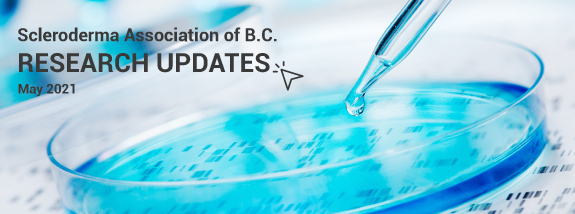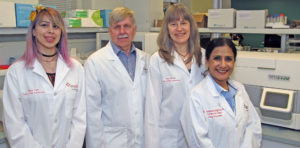Scleroderma Association of B.C. research
Summary of the SABC Research Project
The aim of the SABC Research Program is to identify biomarkers specific to people who have pulmonary fibrosis caused by systemic sclerosis (scleroderma). Being able to distinguish between pulmonary fibrosis that is idiopathic (of various or unknown origin) or the result of scleroderma will allow medical professionals to provide patients with an accurate diagnosis. Identifying reliable biomarkers also provides an opportunity to develop a functional cure; an ongoing treatment that corrects and prevents the disease from continuing to damage the affected organs (in this case, lungs).
SABC funds and co-leads a research study that began recruiting scleroderma patients with and without interstitial lung disease (ILD) in July 2017. Blood samples have also been taken from patients with idiopathic pulmonary fibrosis (IPF) only and both blood and skin samples have been taken from control participants. This research program is creating a firm foundation for intensive research to control lung and skin damage in patients with scleroderma and lung damage in patients with IPF, with the expectation of receiving future support from donations and, hopefully, research funding agencies.
Hello from the Research Team: On 1 January 2021, Dr. Boyang Zheng joined the SABC Research Program as a postdoctoral fellow for one year on a part-time basis to work on the auto-antibody aspect of the Program with Drs. Dunne, Keen, and Ryerson. Dr. Boyang Zheng recently completed his rheumatology fellowship at McGill University in Montréal and will also be seeing patients through the rheumatology and scleroderma clinics at St. Paul’s Hospital.
Follow @SABCResearch on Twitter and Facebook for progress and development updates. These social media handles were created in October 2020 and have been providing communication on this SABC Research Program since.
Research Program Progress
| Mar 2021 | In February 2021, Dr. Keen completed the biostatistical analysis of the biomarker laboratory results obtained before the holiday break in December 2020. The second biomarker laboratory work and biostatistical analysis are planned for early in the second quarter of 2021. Preparation of the samples for the confirmatory miRNA analysis were completed before the end of March 2021. These will be processed by the BC Genome Sciences Centre hopefully in April 2021 so that the bioinformatic and biostatistical analyses can be completed, or at least preliminary results, by the end of June 2021. |
| Dec 2020 | Work continued for continuation of human-participant approval by UBC/Providence and UNBC Research Ethics Boards for the Program and the Scleroderma Biobank at St. Paul’s Hospital in Vancouver. Laboratory prepwork begun for two new biomarker analyses using banked blood samples. The laboratory and bioinformatic analyses for one of these two sub-projects was completed before the holiday break. Blood samples for the miRNA confirmatory cohort for PCR cross-validation were mostly completed but halted due to a global shortage of pipette tips needed for PCR analysis of he COVID-19 virus and its variants of concern. |
| Sep 2020 | Preparation of blood samples for the miRNA confirmatory cohort continued as was preparation of samples for the PCR cross-validation. The results from the analysis of blood samples performed by the Mitogen Advanced Diagnostics Laboratory were accepted during the last week of September 2020. A decision was made to engage on a part-time basis, through existing research funding, a rheumatologist graduating from McGill University to serve as a postdoctoral fellow beginning in January 2021. |
| Aug 2020 | Biostatistical analysis was completed for cytokines for the first miRNA cohort. The remainder of the cytokine samples represents a historical cohort from approximately one decade ago and this required going back to archived electronic and paper records to confirm disease status. Preparation of blood samples for PCR analysis for a second confirmatory batch of samples was commenced. |
| Jul 2020 | Blood samples from 337 participants were prepared and shipped to Eve Technologies for biomolecular analysis of circulating cytokines, which was received at month’s end. Available blood samples continued to be prepared for next generation sequencing of miRNA molecules in the confirmation cohort. |
| Jun 2020 | Decision to pursue peer review and publication in a biomedical journal regarding the diagnostic panel created with known micro-RNA (miRNA) molecules. Preparation and submission of an application to Providence Health Care Research Institute to resume tissue collection to complete the verification cohort. Creation of a co-authorship partnership with Dr. Marvin Fritzler at the University of Calgary for biomolecular analyses of circulating cytokines and factors to be conducted at Mitogen Advanced Diagnostics Laboratory. Planning for resumption of biomolecular processing for the Project by the core research laboratory at St. Paul’s Hospital. |
| May 2020 | Preparation and cost quote for next generation sequencing of miRNA molecules in the confirmation cohort. |
| Apr 2020 | Identification of target biomolecular pathways for inflammation and calcinosis for miRNA’s in the diagnostic panel of known miRNA’s and plans for supporting laboratory analyses. |
| Mar 2020 | Recruitment and sample preparation for verification cohort of miRNA-sequencing and PCR analyses has been placed on hold due to Covid-19. Biostatistical analysis of existing miRNA and clinical data, however, is continuing. |
| Feb 2020 | Bioinformatic verification of PCR lab analysis. |
| Jan 2020 | Polymerase chain reaction (PCR) lab analysis for biochemical pathway predicted by known-miRNA sequencing. |
| Dec 2019 | Approval from University-Industry Liaison Office to publish results for known miRNA’s in medical literature and encouragement to pursue patent protection for novel miRNA’s. |
| Oct 2019 | Invention disclosure to UBC, UNBC, and PCH for known miRNA. |
| Aug 2019 | Completion of differential expression analysis of known and unknown miRNA sequences in blood, skin, and cultured skin-fibroblasts. |
| Feb 2019 | Completion of QC assessment for last third of the samples and QC examination for pilot study of fourth tissue. |
| Nov 2018 | Completion of QC assessment for first two-thirds of the samples. |
| Jul 2018 | miRNA sequence data downloaded for one-third of the samples and quality control (QC) checks started by the scientific team members. |
| May 2018 | Frozen tissue samples from three tissue types transferred to the BC Genome Sciences Centre for sequencing. |
| Apr 2018 | Extraction of micro-RNA (miRNA) from tissue types. |
| Dec 2017 | Skin tissue growth completed. |
| Nov 2017 | Collection of blood and skin tissue samples completed and stored in The Scleroderma Biobank at St. Paul’s Hospital in Vancouver. |
| Jul 2017 | Commence collection of blood and skin tissues from study participants. |
This proof-of-concept study is to discover miRNA sequences and their impact on biochemical processes at the cellular level with the goal of targeted therapeutic interventions to correct the disturbed cycle of regeneration in heart, lung, and skin tissues in scleroderma and lung tissue in IPF. This study is important for the approximately 15,604 Canadians with scleroderma and the approximately 7,045 Canadians with IPF (as confirmed by CT, biopsy, or bronchoscopy). Discovering which miRNA sequences are too low or too high and correcting these imbalances could lead to effective treatment of skin damage in patients with scleroderma and treatment of lung damage in patients with IPF only and in patients with both scleroderma and ILD.
SABC has been behind this project since 2017. Your donations do make a difference in contributing to research that otherwise would not even be considered for funding for these two orphan diseases.
The research team brings together experts in respirology, rheumatology, bioinformatics, and genetical statistics to uniquely tackle this challenge. The team is led by SABC President Rosanne Queen, SABC past President Bob Buzza, Drs. James Dunne and Kevin Keen. Drs. Robert Holt, Chris Ryerson and Pearce Wilcox round out the scientific research team. Both Rosanne and Bob participate on the leadership team to keep us informed on the progress of this SABC-funded research program and to ensure the interests of patients and their families are at the forefront.


